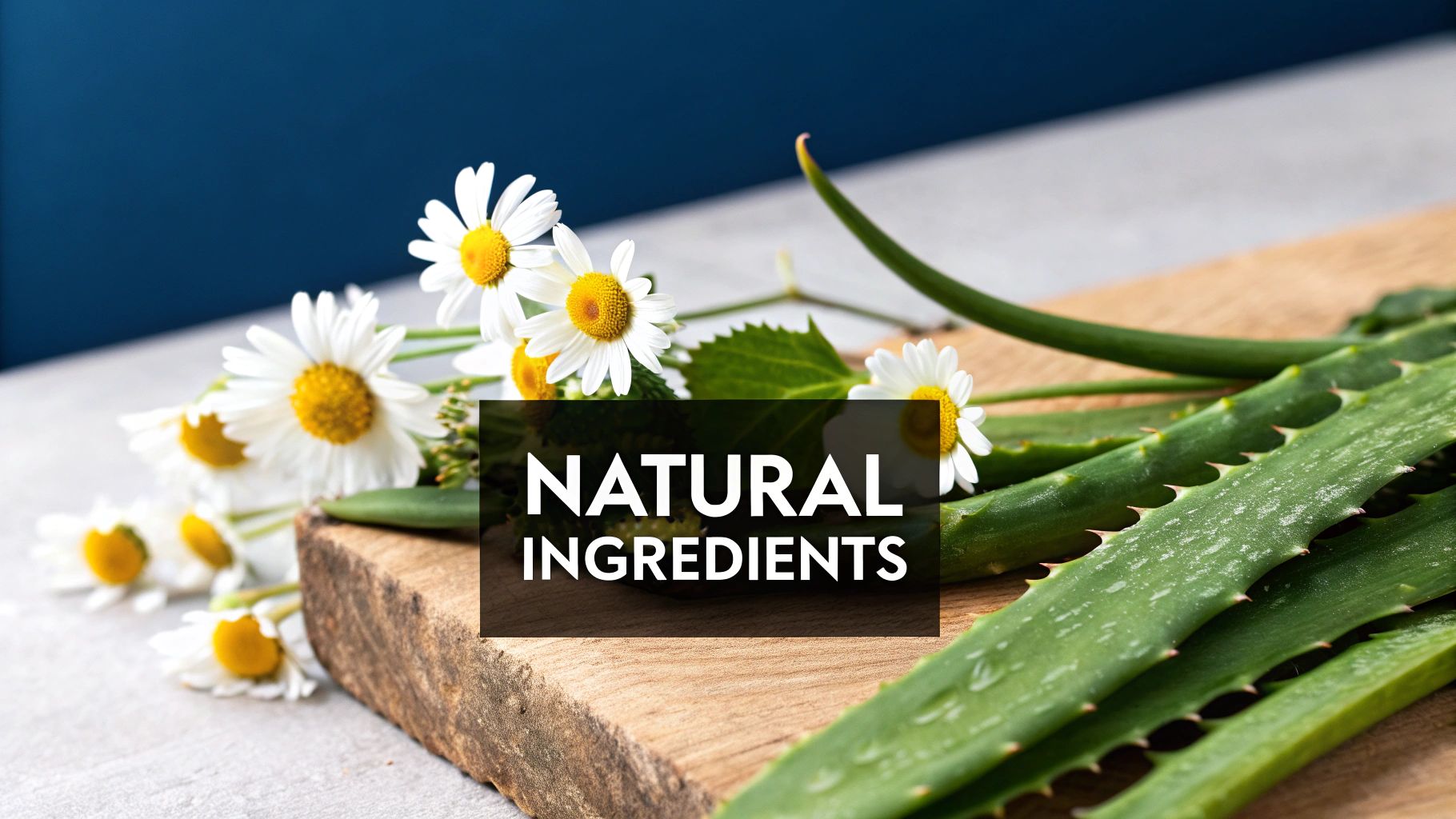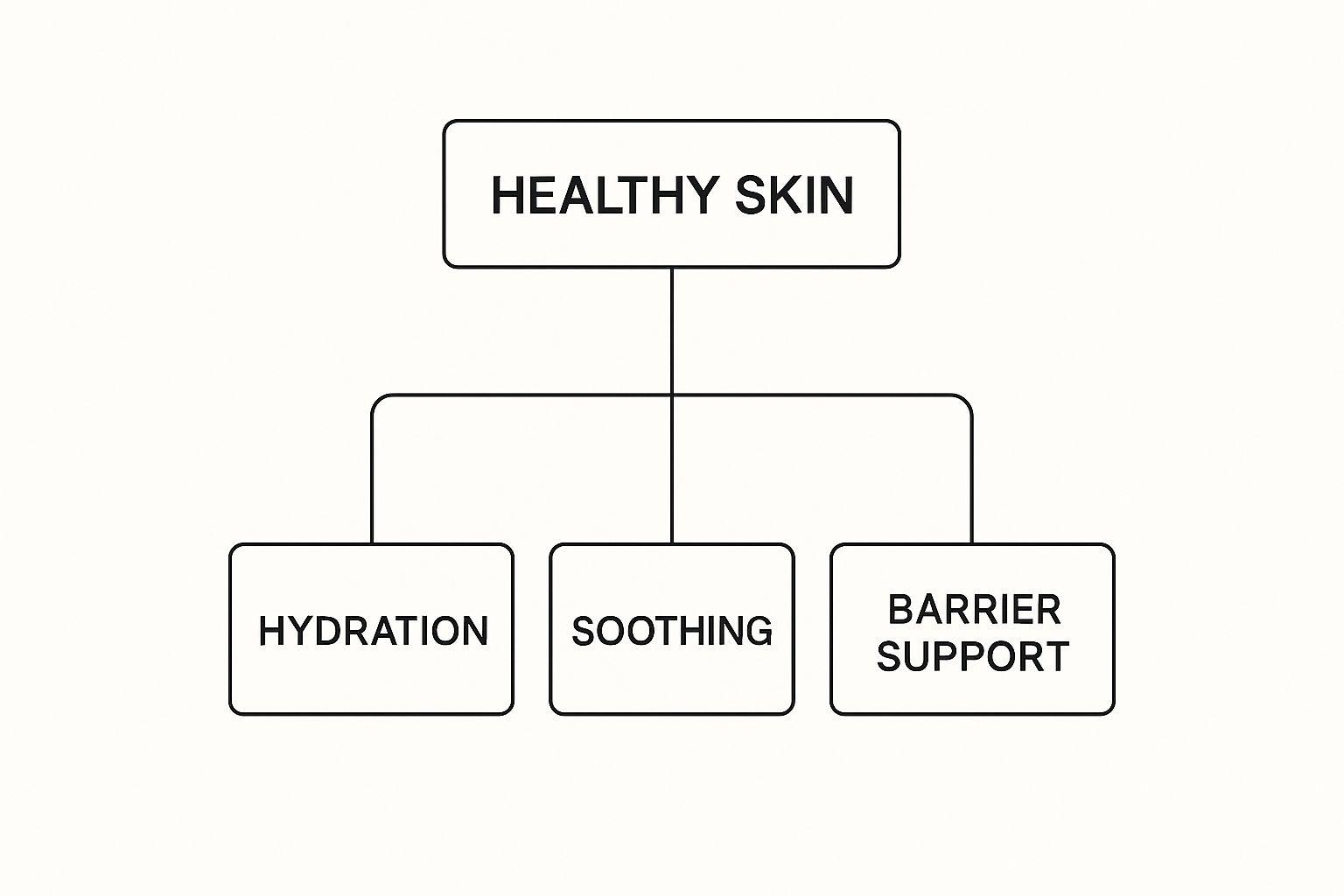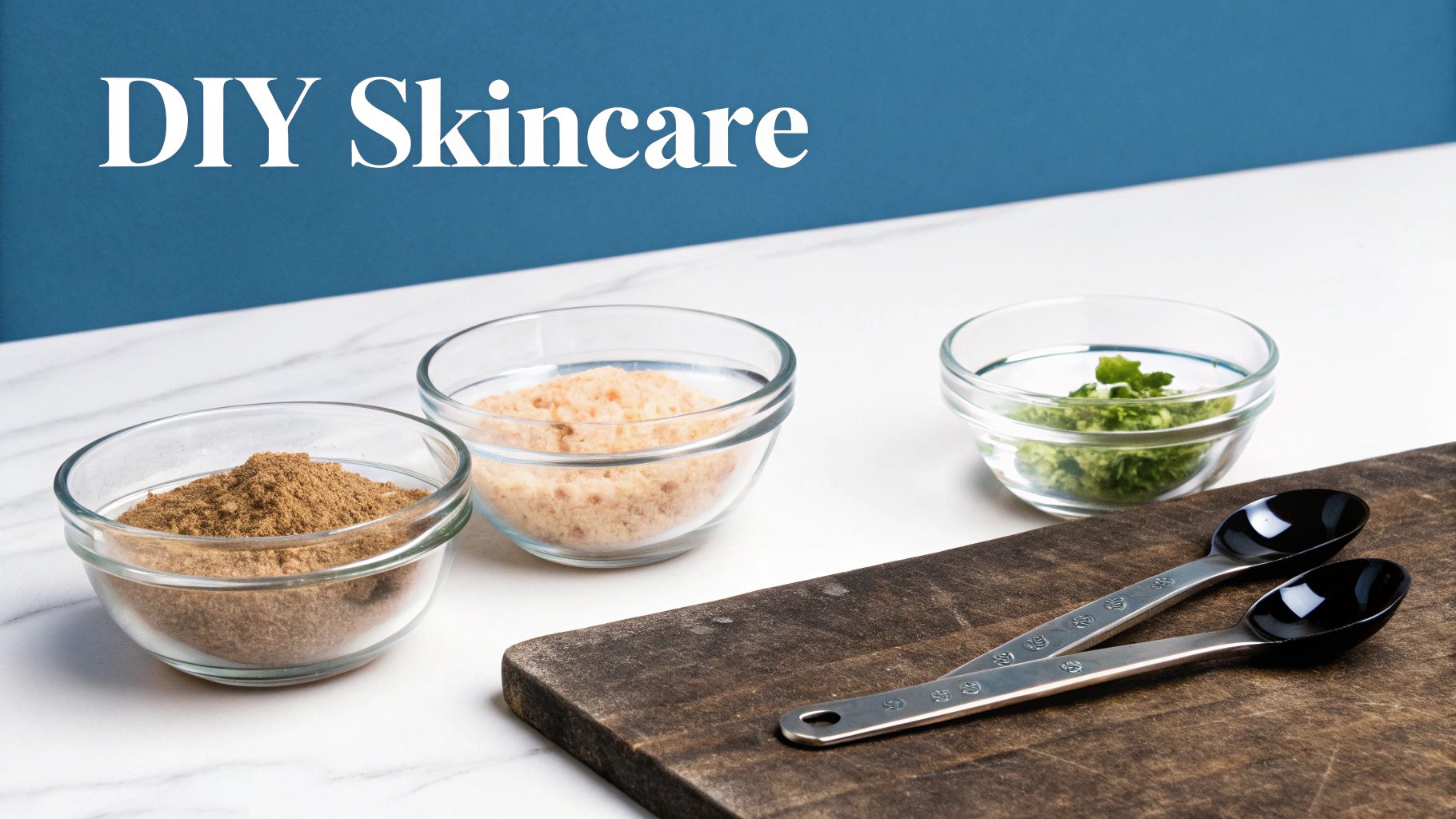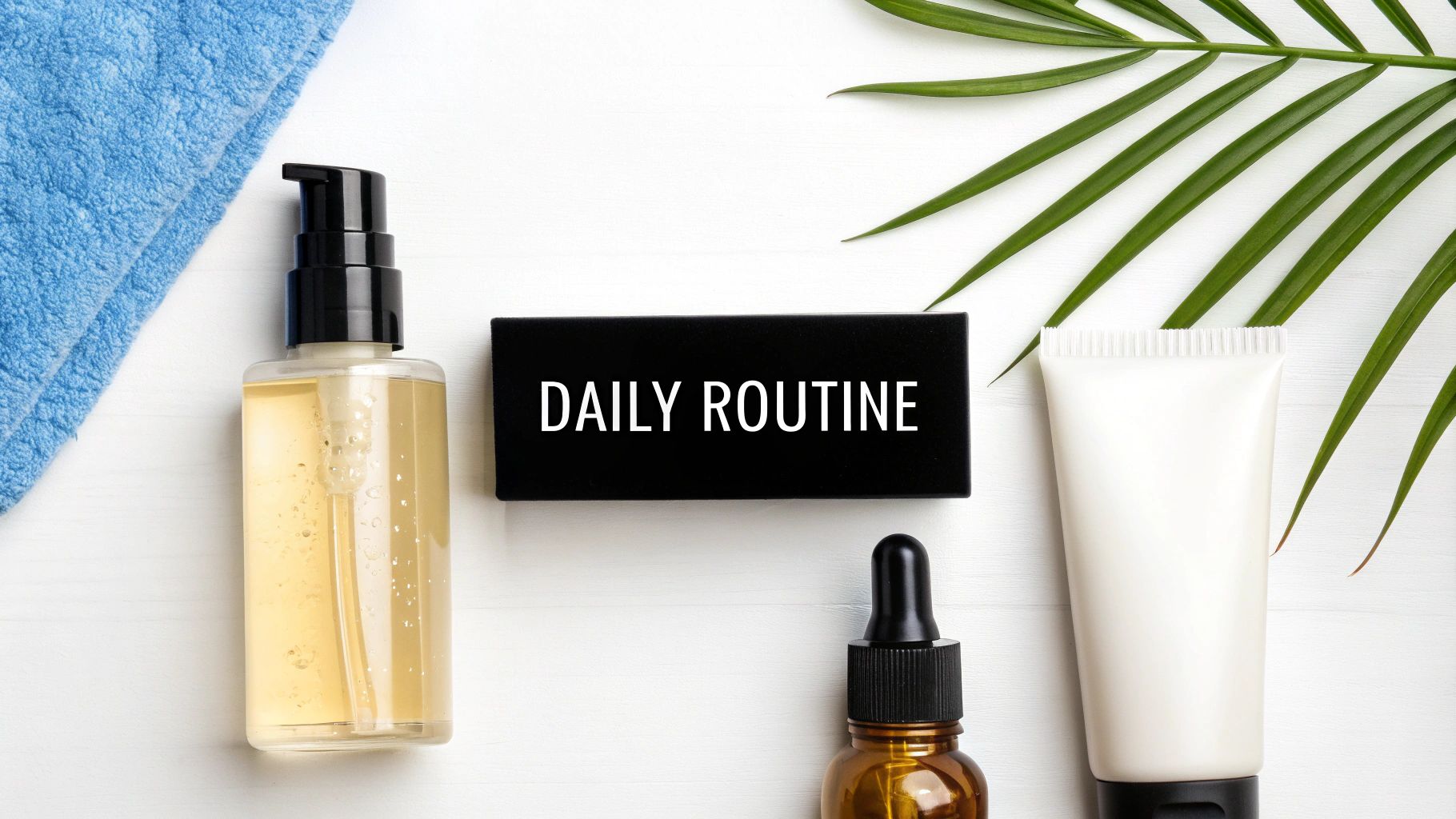
Discover Natural Skincare for Sensitive Skin | Gentle & Effective
Share
Struggling with redness, irritation, and skin that seems to react to everything? If you're on the hunt for natural skincare for sensitive skin, the first step is to really get to grips with what "sensitive" actually means. It's not just about your skin being a bit fussy; it’s a sign that its natural protective barrier has been weakened, leaving it vulnerable to everyday triggers.
What It Really Means to Have Sensitive Skin
Let's be honest, living with sensitive skin can feel like walking on eggshells. One day, your complexion is perfectly calm, and the next, it’s a red, angry mess after trying a new cream or just spending too much time outside. This isn't in your head. It’s a very real state where your skin's defence system is essentially on high alert, all the time.
Think of your skin's outer layer – the lipid barrier – like a brick wall. The bricks are your skin cells, and the mortar holding them together is a mix of natural fats and oils. In healthy skin, this wall is solid and well-maintained. It does a brilliant job of keeping moisture locked in and keeping troublemakers like pollution and irritants out.
But with sensitive skin, that mortar has started to crumble. There are tiny, invisible gaps in the wall. This is why your skin flares up in response to things that don't seem to affect anyone else – a new ingredient, a change in the weather, or even a bit of stress. Those gaps let irritants sneak in and precious moisture escape, leading to the dryness, redness, and discomfort that you know all too well.
Distinguishing Sensitivity from Other Conditions
It's so important to realise that not all reactions are created equal. To find what works for you, you first need to figure out what you’re actually dealing with. What we often lump together as "sensitive skin" can actually be one of a few different issues, and each needs a slightly different game plan.
- True Sensitive Skin: This is often just the skin you were born with, a genetic trait. Your skin naturally has a thinner protective barrier, which means it’s simply more prone to irritation from the get-go.
- Sensitised Skin: This isn't a permanent skin type, but a temporary condition. It’s caused by something you’ve done – maybe over-using harsh scrubs, going too hard on potent ingredients, or getting too much sun. The great news? With a bit of TLC, a sensitised barrier can usually be nursed back to health.
- Allergic Reactions: This is your immune system getting involved. An allergy happens when your body flags a specific ingredient as a threat, triggering a full-blown immune response. Think intense itching, swelling, and redness. Common culprits can be things like synthetic fragrances, certain preservatives, or even some essential oils.
- Irritant Reactions: This is the most common reaction and doesn't involve the immune system at all. It’s simply a case of a substance physically damaging your skin faster than it can repair itself. A harsh cleanser that leaves your skin feeling tight and stripped is a perfect example.
Identifying Your Personal Triggers
Understanding these distinctions is your first real step towards taking back control. It lets you move from being frustrated to being your own skin detective. Start paying close attention to when your skin acts up. Is it right after you use a certain skin care product? When the central heating comes on for the winter? After a particularly stressful week?
The secret to managing sensitive skin isn't about finding one magic potion. It's about building a solid understanding of your skin's unique personality. This knowledge is what empowers you to choose products that will strengthen your skin's defences, not constantly challenge them.
Once you start pinpointing your personal triggers, you can finally move beyond generic advice. This personal insight is the foundation for building a gentle and effective natural skincare for sensitive skin routine that brings real, lasting comfort – not just a quick fix.
Why Natural Ingredients Are Your Skin's Best Ally

Navigating the world of skin care products can feel overwhelming, especially when you’re bombarded with terms like 'natural' and 'clean'. For anyone with sensitive skin, making the wrong choice isn't just a waste of money—it can lead to days of frustrating flare-ups. The trick is to see 'natural' not as a trendy label, but as a genuine philosophy: working with your skin's biology, not fighting against it.
When your skin's protective barrier is weakened, it becomes a magnet for irritation from synthetic ingredients. Think of common culprits like harsh chemicals, aggressive foaming agents like sulphates, and artificial fragrances. They can act like tiny intruders, stripping away the very oils your skin needs to stay calm and balanced, leaving it feeling tight, red, and angry.
On the other hand, well-chosen natural ingredients behave more like trusted friends. Plant extracts often come packed with a complex cocktail of vitamins, antioxidants, and anti-inflammatory compounds that your skin instinctively knows how to use. It’s like feeding your body a nutrient-dense meal instead of junk food; you're giving your skin the essential building blocks it needs to repair itself and build resilience.
So, What Does 'Natural' Really Mean in Skin Care Products?
When we talk about 'natural' skincare, we mean ingredients that come from plants, minerals, or animal by-products, rather than being cooked up from scratch in a laboratory. The term isn't tightly regulated, however, so a bit of savvy is required. A truly natural skin care product focuses on ingredients that are processed as little as possible to keep all their wonderful, skin-loving properties intact.
This move towards gentler, plant-powered care is no longer a niche interest, especially for those of us hunting for natural skincare for sensitive skin. People are paying far more attention to what they put on their faces, and the market reflects that shift.
For example, the UK organic skincare market was worth around $485.9 million back in 2021 and is expected to more than double by 2030. This boom is almost entirely down to people demanding skin care products with clear, natural ingredient lists. In fact, face creams and moisturisers alone account for over 44% of those sales. You can explore more about these skincare market trends and what's fuelling them.
Why Plant-Based Compounds Work So Well
The real power of natural ingredients comes down to one key concept: biocompatibility. Because they originate from living things, their molecular make-up can be strikingly similar to the components of our own skin. This means they can be absorbed and put to work more easily, offering support without sounding the alarm bells that trigger a reaction.
When you use a skin care product rich in plant oils and butters, you're doing much more than just moisturising. You're actually reinforcing your skin's own lipid barrier. Think of it as giving your skin the raw materials it needs to patch up the 'mortar' between its cells—a crucial step for calming sensitivity.
This approach is all about nurturing long-term skin health, not just papering over the cracks. Instead of masking symptoms, the right natural ingredients get to the root of the problem. They help to:
- Soothe Inflammation: Ingredients like chamomile, calendula, and oat extract are champions of calm, proven to visibly reduce redness and dial down discomfort.
- Deliver Antioxidants: Natural powerhouses like green tea, rosehip oil, and vitamin C act as bodyguards, protecting your skin from environmental aggressors that love to provoke sensitive skin.
- Fortify the Barrier: The fatty acids found in shea butter, jojoba oil, and sunflower oil are brilliant at replenishing the skin’s protective layer, locking in precious moisture while keeping irritants out.
By building a routine around these kinds of ingredients, you can gently guide your skin back to a place of balance, strength, and calm.
The Best Calming Ingredients for Your Skin Care Products
Diving into the world of natural skincare for sensitive skin can feel a bit like learning a new language. You're faced with endless lists of extracts, oils, and compounds on product labels—how do you know which ones will actually bring you relief?
Think of this as your cheat sheet for spotting the genuine heroes that will help you find your way to calm, happy skin.
It helps to think of these ingredients as having specific jobs. Some are Peacekeepers, experts at dialling down redness and irritation. Others are Hydration Heroes, tasked with quenching thirsty, tight-feeling skin. And finally, you have the Barrier Builders, which reinforce your skin’s front-line defences. When you understand these roles, you can pick skin care products that give your skin precisely what it needs.
This visual guide shows how these key benefits—soothing, hydration, and barrier support—all work together to create healthy, resilient skin.

As you can see, a balanced approach is everything. You can't achieve truly calm skin without addressing all three pillars.
The Peacekeepers: Soothing Redness and Irritation
When your skin is acting up, your first priority is to calm the storm. This is where the Peacekeepers come in. These are natural ingredients celebrated for their powerful anti-inflammatory properties, working to quieten redness and soothe discomfort almost immediately.
Look out for these on the ingredient lists of your skin care products:
- Chamomile: This gentle flower is a classic for good reason. It’s packed with compounds like bisabolol that are proven to calm irritation and take the sting out of angry skin.
- Calendula: Extracted from marigold flowers, calendula is prized for its ability to soothe and help repair compromised skin. It’s especially brilliant for skin that feels raw or over-exposed.
- Aloe Vera: It’s so much more than just a sunburn remedy. Aloe vera delivers a cooling sensation while supplying a dose of vitamins and anti-inflammatory agents right where your stressed skin needs them.
Think of these ingredients as the emergency services for a flare-up. They offer immediate comfort and are essential in any routine focused on natural skincare for sensitive skin.
The Hydration Heroes: Quenching Thirsty Skin
Sensitive skin is almost always dehydrated skin. When the skin’s protective barrier is weakened, it struggles to hold onto moisture, leading to that tight, flaky, and uncomfortable feeling. The Hydration Heroes are ingredients that excel at drawing moisture deep into the skin and, crucially, locking it there.
Proper hydration is the absolute foundation of healthy skin. It not only plumps and smooths your complexion but also helps the skin barrier function properly, making it far less susceptible to external irritants.
One of the most effective natural hydrators is plant-derived hyaluronic acid. It acts like a tiny sponge, pulling in up to 1,000 times its own weight in water to provide deep, lasting moisture without feeling heavy or clogging pores. You can explore this topic further in our guide explaining how hydration is the secret to youthful skin.
The Barrier Builders: Reinforcing Your Defences
While soothing and hydrating are vital for immediate relief, the long-term goal is to strengthen your skin's natural defences so it becomes less reactive over time. Enter the Barrier Builders. These ingredients provide the raw materials your skin needs to repair its protective lipid layer, effectively patching up the gaps in its "brick wall".
These champions are rich in fatty acids and other lipids that mimic your skin's own structure:
- Oat Extract (Avena Sativa): Colloidal oatmeal is a superstar for a reason. It creates a protective film on the skin that locks in moisture while actively soothing itchiness and irritation.
- Ceramides: These lipids are the real deal—they're naturally found in your skin and make up over 50% of its barrier. Adding plant-derived ceramides to your routine helps replenish what’s been lost, directly reinforcing your skin’s structure from the inside out.
- Shea Butter & Jojoba Oil: These beautiful plant-based butters and oils are rich in fatty acids that nourish and fortify the skin barrier, boosting its resilience against everyday triggers.
By inviting these builders into your daily routine, you can shift from constantly managing flare-ups to proactively building stronger, healthier, and more resilient skin.
To help you spot these powerhouses when you're next shopping for skin care products, here’s a quick-reference table.
Key Natural Ingredients for Sensitive Skin
This table breaks down some of the most gentle yet effective natural ingredients, highlighting their main benefits and where you're most likely to find them.
| Ingredient | Primary Benefit | Commonly Found In |
|---|---|---|
| Chamomile | Reduces redness | Calming cleansers, toners, and masks |
| Calendula | Soothes irritation | Serums, moisturisers, and salves |
| Oat Extract | Builds barrier function | Gentle cleansers and barrier creams |
| Plant Hyaluronic Acid | Deeply hydrates | Serums and moisturisers |
| Ceramides | Reinforces structure | Night creams and restorative treatments |
| Shea Butter | Nourishes & protects | Rich moisturisers and body butters |
Having this knowledge on hand makes it so much easier to choose skin care products that will genuinely nurture and support your sensitive skin, rather than just guessing.
Your Step-by-Step Natural Skincare Routine
Feeling swamped by those complicated 10-step routines you see everywhere? You’re not alone. When you have sensitive skin, piling on more skin care products is rarely the answer. The real goal is to build a simple, consistent ritual that strengthens your skin, not one that constantly throws new challenges its way.
Think of this as your practical blueprint for a gentle yet effective natural skincare for sensitive skin routine. It’s all about nailing the essentials—the core pillars that deliver real results without adding any stress to your life or your complexion.
The Golden Rule Before You Begin
Before we get into the products, there’s one non-negotiable rule for anyone with sensitive skin: patch test everything. Honestly, this is the most crucial step. Even a skin care product that sounds incredibly natural and gentle can cause a reaction on your unique skin.
Just dab a small amount of the new product on a discreet spot, like behind your ear or on the inside of your arm. Give it at least 24 hours to see if any redness, itching, or irritation pops up. This one simple habit can save you from a full-blown flare-up.
Step 1: The Gentle Cleanse
The whole point of cleansing is to get rid of the day’s grime—makeup, impurities, and excess oil—without stripping your skin of its natural defences. For sensitive complexions, those harsh, foamy cleansers are public enemy number one. They can wreck your skin’s delicate lipid barrier, leaving you with that tight, dry, and irritated feeling we all dread.
Instead, reach for cleansers that are:
- Cream or Milk-Based: These cleanse beautifully without any aggressive lathering, leaving skin feeling soft and comfortable.
- Oil-Based: An oil cleanser is fantastic at dissolving stubborn makeup and sunscreen without upsetting your skin's natural balance.
- Completely Fragrance-Free: This is a big one. Both synthetic and natural fragrances can be major triggers for irritation.
When you wash your face, always use lukewarm water—never hot—and just your fingertips. Afterwards, gently pat your skin dry with a soft towel. No rubbing!
Step 2: The Calming Toner or Mist
Forget those old-school, alcohol-heavy astringents that made your skin feel tight as a drum. Today’s natural toners for sensitive skin are all about hydrating, calming, and prepping your skin for what comes next. Their job is to add a soothing layer of moisture right back into the skin after cleansing.
Look for alcohol-free mists or toners with calming ingredients like rosewater, chamomile, or calendula. A quick spritz can instantly ease any feelings of tightness and begin to soothe surface redness. It also leaves your skin slightly damp, which helps it absorb your serum much more effectively.
A key shift we're seeing is the move towards truly personal skincare. Recent industry reports note that while the UK skincare market's growth has settled at 7.9%, there's a huge opportunity in serving specific needs like sensitivity. UK consumers are now actively seeking routines built for their individual concerns. You can read more about these evolving consumer skincare needs at Mintel.com.
Step 3: The Targeted Serum
A serum is your power-packed treatment step. It’s a lightweight, concentrated formula designed to tackle specific issues head-on. This is where you can deliver a potent dose of calming, hydrating, or barrier-boosting ingredients directly where they’re needed most.
For sensitive skin, a serum with plant-derived hyaluronic acid is a brilliant choice for an intense hydration boost. Others might feature niacinamide to help dial down redness, or ceramides to help reinforce your skin’s protective barrier. To learn more about fitting this into a complete ritual, check out our guide on The Ultimate Skincare Routine for Radiant, Healthy Skin. Just remember to introduce only one new serum at a time.
Step 4: The Nourishing Moisturiser
This is a non-negotiable step, even if your skin leans oily. A great moisturiser for sensitive skin does two critical things: it adds hydration, and just as importantly, it locks that moisture in by supporting your skin's barrier.
Look for moisturisers rich in ingredients like shea butter, jojoba oil, or oat extract. These provide the essential fatty acids and lipids that act like mortar between your skin cells, preventing water from escaping and shielding your skin from external irritants. Apply it morning and night to keep your skin feeling supple and resilient.
Step 5: The Mineral SPF Protection
The sun is a major trigger for sensitive skin, capable of making redness and irritation much worse. The trouble is, many chemical sunscreens can be irritating themselves. The solution? A mineral-based SPF.
Mineral sunscreens work by using physical blockers like zinc oxide and titanium dioxide. These ingredients sit on top of the skin and create a physical shield that deflects UV rays, rather than being absorbed into the skin. They are far less likely to cause a reaction, making them the undisputed gold standard for protecting sensitive complexions every single day.
Natural Ingredients That Can Still Cause Irritation

It’s one of the most important lessons in skincare: "natural" doesn't automatically mean "gentle." This is especially true when you have a delicate complexion. Building a truly effective natural skincare routine for sensitive skin is less about trusting a green label and more about becoming a savvy ingredient detective.
This isn’t about blacklisting ingredients. The reality is, many compounds that are fantastic for other skin types can simply be too powerful for a compromised skin barrier. Knowing which natural ingredients are common culprits for irritation is your best defence against those frustrating flare-ups. It’s the key to creating a routine that genuinely calms and supports your skin.
Potent Essential Oils
Essential oils are incredibly concentrated plant extracts. While they pack a punch with benefits, that very potency can be their downfall for sensitive skin. Some oils are notorious for causing redness, itching, and even contact dermatitis in reactive individuals.
Keep an eye out for these common offenders in your skin care products:
- Citrus Oils: Think lemon, orange, grapefruit, and bergamot. They smell amazing but can be photosensitive, meaning they react with sunlight to cause irritation on your skin.
- Tea Tree Oil: It’s famous for its antibacterial power, but in high concentrations or used neat, it can be incredibly harsh, leading to severe dryness and stinging.
- Mint Oils: That cool, tingling feeling from peppermint or menthol? For sensitive skin, that's often a distress signal, not a sign that it’s working.
This doesn't mean all essential oils are off the table. It just means you need to treat them with respect and always, always do a patch test before trying something new.
Natural Astringents
Astringents work by tightening pores and mopping up excess oil. But for sensitive skin, which desperately needs to hang on to its natural moisture, some of these can be far too stripping. The most common natural astringent you'll come across is witch hazel.
While it has some lovely anti-inflammatory properties, most commercial witch hazel products contain a high percentage of alcohol leftover from the distillation process. This alcohol is a major problem, as it can be incredibly drying and disrupt your skin's protective barrier, leaving it even more sensitive and dehydrated. If you want to try witch hazel, make sure the label explicitly states it's "alcohol-free."
Understanding what an ingredient does is just as important as knowing its name. For sensitive skin, the goal is always to support and strengthen the lipid barrier, not strip it away with harsh ingredients—natural or not.
Harsh Physical Exfoliants
Who doesn’t love the idea of sloughing off dead skin to reveal a brighter, smoother complexion? The method, however, is what really matters. Harsh physical scrubs can cause micro-tears in the skin, which is the last thing you want for a barrier that’s already struggling.
Be wary of any scrub that feels gritty or sharp. These often contain particles like:
- Fruit Pits or Nut Shells: Ground-up apricot kernels or walnut shells are infamous for being jagged and abrasive, essentially scratching the surface of your skin.
- Large-Grain Sugars or Salts: While great for a body scrub, these chunky crystals are usually too aggressive for the delicate skin on your face.
Instead of these rough options, look for much gentler physical exfoliants, like finely milled oat flour or jojoba beads. Better yet, consider shifting to a mild chemical exfoliant, such as lactic acid, which dissolves the bonds holding dead skin cells together without any scrubbing at all. Getting to know these potential irritants puts the power back in your hands, ensuring your natural routine is a source of calm, not chaos.
How Your Lifestyle Affects Your Sensitive Skin

Truly great skincare goes far beyond the skin care products on your bathroom shelf. In reality, it’s a mirror reflecting your overall wellbeing. The link between your daily habits and how reactive your skin is can be surprisingly strong. Figuring out how things like diet, stress, and hydration can either soothe or trigger your sensitivity is the key to achieving real, lasting comfort.
Think of your skin as a messenger. When it acts up with redness, itching, or dryness, it’s often trying to signal that something inside is out of balance. Listening to those signals is a fundamental part of caring for a reactive complexion.
The Impact of Diet and Hydration
What you eat and drink quite literally fuels your skin. A diet heavy on inflammatory foods—think processed snacks, too much sugar, or even dairy for some people—can easily make redness and irritation worse. On the flip side, consciously adding anti-inflammatory foods can have a profoundly calming effect, working from the inside out.
- Omega-3 Fatty Acids: You’ll find these in salmon, walnuts, and flaxseeds. These healthy fats are brilliant for strengthening the skin’s natural barrier, helping it stay resilient against irritants.
- Antioxidant-Rich Foods: Berries, leafy greens, and brightly coloured vegetables are packed with antioxidants that help shield skin cells from environmental stress, a common culprit behind heightened sensitivity.
Hydration is just as vital. When your body is dehydrated, your skin is one of the first places to show it, becoming tight, dull, and far more prone to irritation. You can dive deeper into this with our guide on how to treat dehydrated skin, which is full of practical tips.
Managing Stress and Environmental Factors
Stress isn't just in your head; it has a very real, physical impact on your skin. High stress levels cause a surge in cortisol, a hormone that can weaken your skin’s defences and trigger inflammatory responses. That's why a tough week at work can suddenly result in an unexpected flare-up.
Adopting simple mindfulness practices can be a surprisingly effective skincare tool. Even a few minutes of deep breathing or meditation each day can help lower cortisol levels, giving your skin a chance to find its calm.
Beyond what’s happening internally, your immediate environment plays a huge part. Things like air pollution and even the minerals in hard water can act as major irritants, leaving a residue that disrupts your skin’s natural balance and leads to dryness. A gentle but thorough cleanse at the end of the day is your best line of defence.
How Ageing Influences Sensitive Skin in the UK
Your skin's needs are not static; they change throughout your life. As we get older, our skin naturally becomes thinner, produces less of its protective oils, and struggles more to hold onto moisture. This combination often leads to increased dryness and sensitivity, making a gentle, nurturing approach more critical than ever.
This is having a visible effect on the UK skincare market. The 60-74 age group, for instance, swelled from 9.7 million people in 2014 to an estimated 11.1 million by 2024. As this demographic grows, so does the demand for natural skincare for sensitive skin that’s designed for more delicate complexions. You can explore more on how these UK demographic trends influence the cosmetics industry.
By understanding these connections between lifestyle and skin, you can build a routine that truly supports and nurtures your complexion, no matter what life throws at it.
Your Natural Skincare Questions, Answered
Deciding to go natural with your skincare is a fantastic step, especially when you're dealing with sensitive skin. But it's completely normal for questions to pop up along the way. You might be wondering if you have to give up your favourite anti-ageing treatments or just how long it’ll take to see a real change. Let's walk through some of the most common queries to get you feeling confident and clear on your new path.
Can I Still Use Anti-Ageing Products with Sensitive Skin?
Absolutely! You just need to be a bit more strategic about your choice of skin care products. The great news is that the natural world is packed with powerful anti-ageing ingredients that are much kinder to delicate skin than many of their synthetic counterparts.
Instead of reaching for aggressive retinoids that can often leave sensitive skin red and unhappy, it’s about finding gentler, plant-based alternatives. These can offer brilliant firming and brightening results without compromising your skin's delicate barrier.
Here are a few gems to look out for:
- Bakuchiol: Often hailed as nature’s answer to retinol, this plant extract is a star at improving skin texture and smoothing out fine lines, but without the typical redness and peeling.
- Rosehip Oil: A true classic for a reason. This beautiful oil is naturally loaded with vitamins A and C, which encourage cell turnover and boost your glow, all while deeply nourishing the skin.
- Peptides: Think of these as tiny messengers. Peptides are short chains of amino acids that signal your skin to produce more collagen, helping to gently firm and improve elasticity over time.
Whenever you bring a new active skin care product into your routine, remember the golden rule: start low and go slow. Always do a patch test first, and begin by using the product just a couple of times a week. You can gradually build up from there as your skin gets used to it.
How Long Until I See a Real Difference in My Skin?
When it comes to a natural skincare for sensitive skin routine, patience truly is a virtue. You'll likely notice some immediate perks, like your skin feeling more hydrated and looking calmer, within the first week or two. But the bigger, more lasting changes take a little more time to show themselves.
To see a real improvement in texture, a noticeable reduction in redness, and a stronger, more resilient skin barrier, you need to stick with it for at least one or two full skin cycles. Your skin renews itself roughly every 28 days, so giving your new routine four to eight weeks of consistent use is a realistic timeframe.
Think of it like tending to a garden. You wouldn't expect a seed to become a fully bloomed flower overnight. It needs consistent care—the right soil, water, and sunlight—to grow strong and flourish. Your skincare routine is the same; it's a long-term investment in your skin's health, not a quick fix.
What Is the Difference Between 'Fragrance-Free' and 'Unscented'?
This is a really important one to get your head around, as it can save you from a world of irritation. The two terms sound similar, but for sensitive skin, they mean very different things.
- Fragrance-Free: This is what you should always be looking for. It means the skin care product contains zero added fragrances—no synthetic chemicals and no natural essential oils—put there just to make it smell a certain way.
- Unscented: This label can be quite sneaky. It often means that masking agents (which are a type of fragrance) have been added to the formula to cover up the natural smell of the ingredients. These chemicals can be just as irritating as any other fragrance.
To keep your skin happy, always make it a rule to choose products that are clearly labelled ‘fragrance-free’. It's the simplest way to sidestep a huge category of potential triggers and give your skin the calm it deserves.
Ready to build a routine that truly nurtures your sensitive skin? Explore the curated collections at P-Eleven and discover gentle, effective solutions to help you achieve a calm, radiant complexion. Find your perfect match at p-eleven.com.


